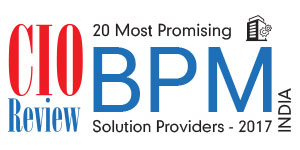 The Indian Business Process Management (BPM) industry is on the cusp of a significant transformation as a result of which, BPM players across the globe are being presented with immense opportunities to explore novel and effective ways of providing services and expanding their portfolio. However, oftentimes, these opportunities tend to be overshadowed by more pressing concerns that accompany the implementation of new frameworks in a rapidly evolving technology landscape. As the implementations are characterized by more complex and multifaceted processes than other software implementations, organizations encounter challenges with strategizing an appropriate roadmap, aligning the processes with real-time intelligence, integrating the applications with other processes, and enabling cross functional collaboration and communication across the enterprise. Acknowledging and addressing all facets of these challenges, Interfacing Technologies aligns organizations with a comprehensive suite of software tools to model, map and manage their business transformation.
The Indian Business Process Management (BPM) industry is on the cusp of a significant transformation as a result of which, BPM players across the globe are being presented with immense opportunities to explore novel and effective ways of providing services and expanding their portfolio. However, oftentimes, these opportunities tend to be overshadowed by more pressing concerns that accompany the implementation of new frameworks in a rapidly evolving technology landscape. As the implementations are characterized by more complex and multifaceted processes than other software implementations, organizations encounter challenges with strategizing an appropriate roadmap, aligning the processes with real-time intelligence, integrating the applications with other processes, and enabling cross functional collaboration and communication across the enterprise. Acknowledging and addressing all facets of these challenges, Interfacing Technologies aligns organizations with a comprehensive suite of software tools to model, map and manage their business transformation.Headquartered in Montreal Canada, with its Asia office at Kolkata, Interfacing Technologies was established in 1983 as an MRP software solutions provider for small and medium-sized aerospace and manufacturing companies. A decade into its inception, the company developed extensive process knowledge and expertise across different verticals, which in turn paved the way for its venture into the Business Process Re engineering (BPR) arena in 1993. Interfacing has since catered to the complete BPM requisites of organizations as an enabler to multiple business challenges and objectives. “Our biggest strength within this space is our ability to enable complex business transformation programs. Our solution serves as an inclusive management system that can support complex projects and foster greater visibility, change management and continuous improvement within organizations,” affirms Scott Armstrong, Managing Partner, Interfacing Technologies.
In order to alleviate the complexities associated with BPM implementation, Interfacing Technologies equips organizations with
Enterprise Process Center(EPC),a complete Business Process Management(BPM)solution which helps companies streamline operations, enforce adequate governance and compliance, and increase their overall productivity. This solution supports the full range of process management initiatives; documentation and deployment, Process Governance, Service Oriented Architecture (SOA)implementation,and total process improvement through its integrated Business Intelligence and Performance modules. EPC also incorporates a centralized repository to store and manage processes and information within a user-friendly and intuitive environment. Through linking complex artifacts, processes, employees, customers, capabilities and performance indicators, Interfacing’s EPC creates a 360degree blueprint of an organization’s architecture. Furthermore, this framework also enables clients to be well equipped at the onset of sudden risks and disasters by facilitating them with effective risk control and process risk management strategies. EPC also links all employees across an enterprise to a centralized reusable repository, thereby facilitating greater collaboration, accountability and governance with organizations.
Having served over 500 enterprises from diverse industries such as energy, finance, telecom, government and healthcare to name a few, Interfacing has procured a global clientele across Europe, the Americas, Africa, and the Asia Pacific. Leveraging its partnerships across these regions, the company intends to further expand its reach across the globe as well as invest in operational intelligence and the “Business Operating System” model to equip organizations with improved insights to effectively monitor and manage their business operations, adapt to moving strategic targets, and measure business outcomes over time.

Interfacing Technologies aligns organizatioons with a comprehensive suite of software tools to model, manage and monitor their business transformation
Having served over 500 enterprises from diverse industries such as energy, finance, telecom, government and healthcare to name a few, Interfacing has procured a global clientele across Europe, the Americas, Africa, and the Asia Pacific. Leveraging its partnerships across these regions, the company intends to further expand its reach across the globe as well as invest in operational intelligence and the “Business Operating System” model to equip organizations with improved insights to effectively monitor and manage their business operations, adapt to moving strategic targets, and measure business outcomes over time.






